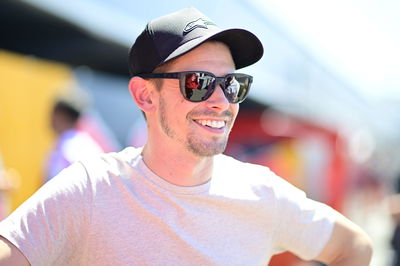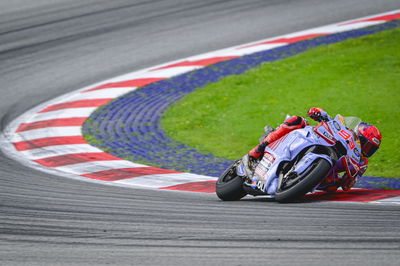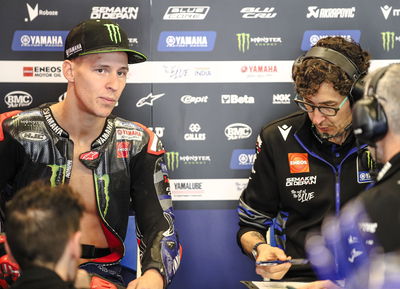Ducati ‘going to have an advantage’ in MotoGP 2027 rules - Casey Stoner
“That gap, to them, is going to be even larger than it is now.”

The 2027 MotoGP rules are largely hoped to address to some extent some of the perceived problems that the championship currently faces, but Casey Stoner is decidedly pessimistic.
Stoner, who won Ducati’s first MotoGP title in 2007, thinks the Italian manufacturer will continue to be at a performance advantage under the new regulations.
“I think it’s Ducati, basically, trying to get those rules implemented again,” Stoner said when speaking to Neil Hodgson on the Ducati Diaries podcast.
“I think they know that they’re going to have an advantage in that situation. If you think about it, if you’ve already got a lot of power — everyone’s got a lot of power now, and yet they’ve [Ducati] still got an outstanding difference — the gap’s going to be bigger when you go to a smaller [displacement] engine.
“That gap, to them, is going to be even larger than it is now.”
The potential for continued domination by Ducati, which has won 10 of the first 11 races in 2024, is not the only cause for Stoner’s concern.
“The braking [zones] are going to shrink, when the braking [zones] shrink there’s less overtaking opportunities,” he said.
Additionally, “Corner speed might pick up, which allows for less overtaking again because it’s not like 125s, 250s, Moto3, it’s not like that; there’s still enough power to separate everyone [under acceleration], but everything’s going to shrink now in terms of overtaking opportunities, in my opinion.
“They’ve done some of the right things with some of the stuff that’s being removed (such as ride height devices), but the rest of it isn’t even close to what it needs to be.”
Stoner’s fundamental concern with the 2027 MotoGP regulations is that they don’t address what he sees as a core issue in the current rules, which is that the technology is becoming too advanced.
“I still feel like they’re Formula 1 cars with two wheels,” the two-times MotoGP World Champion said. “We’ve got traction control, wheelie control and everything that Formula 1 doesn’t have.
“I understand that bikes need to go forwards technically to a certain degree, but there’s a point that it has to stop.”
The advancement of technology means that it’s harder for riders to showcase their talent, in Stoner’s opinion.
“I want to see these riders’ talent. I want to watch a slow-mo’ and instead of winglets flexing I actually want to see these guys sliding, controlling a wheelie, finding grip where there’s no grip. That’s what these things are about, and the challenge.”
In Stoner’s opinion, the bikes should become more difficult to ride, not easier.
“People complain all the time in motocross that the 450s are too powerful, they complain about these MotoGP bikes are too powerful, they’re too big,” he said. “[But] it’s the point, you have to learn to control that power.
“They’re talking about these electric bikes, ‘they’re so much easier to ride’ — then count me out. I don’t want something that’s easy to ride, I want something that’s hard to ride. When that grip level disappears, when it’s harder to ride is when you need to start watching what people are capable of.
“Right now, we’re not watching a championship that’s showcasing talent, we’re watching a championship where the engineers are trying to take riders out of the equation. They want to get to the point where they can stick just about any rider on and they’re going to be somewhat competitive.
“Essentially, it ends up like Formula One where it depends what car you’re in, rather than the actual talent of the driver, or [in the case of MotoGP] the rider. It’s very hard for me to sit back and watch because I’ve seen this happening.
“I would like to see the best riders in the world riding the toughest bikes, not because they’re easy to ride. I don’t want them easier to ride; if anything, harder, and you’ve got to try and make the best of it.”
From Stoner’s perspective, the inability of the riders to make a difference with their talent means the quality of the racing suffers.
Stoner compared the racing in current MotoGP to that seen in AMA Supercross, where contact is a fundamental part of racing on tight stadium tracks with limited line choice.
“We’re starting to see [that kind of racing] now in MotoGP,” Stoner said. “People are just seeing a gap and taking it.
“It goes down to something that, for me, is an incredibly immature way of thinking, which is to win at all costs.
“I hate that way of thinking. I mean, if you stop and actually think about what you’re saying, or what somebody is willing to do, it’s the lowest of low in my opinion: basically saying ‘I’m not good enough to win, so I will take whatever road I need to to get it done’.”
Stoner did concede that occasional contact is a part of racing, but said “when you’re going in there with intent to either take someone out or without even worrying that you are going to hit someone just because you want that piece of track — for me, that’s a thoughtless way of racing.
“It’s not actually being intelligent; number one for championships, number two [because] you can also bring yourself down, which we see a lot of those guys do in [AMA] Supercross.
“But it’s starting to happen in MotoGP and, unfortunately, a lot of the MotoGP ones are happening because of the bikes, and all the problems that we’re seeing with all of the aero and winglets, and the only way they can actually make an overtake is to risk it all on the brakes.”












